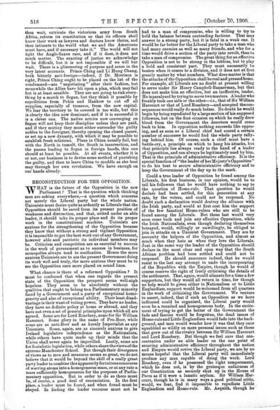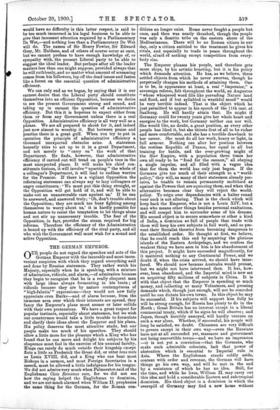RECONSTRUCTION FOR THE OPPOSITION.
WHAT is the future of the Opposition in the new Parliament ? That is the question which thinking men are asking everywhere,—a question which concerns not merely the Liberal party but the whole nation. Unionists must desire quite as ardently as Liberals that the Opposition should be saved from its present position of weakness and distraction, and that, united under an able leader, it should take its proper place and do its proper work in the constitutional machine. Unionists are anxious for the strengthening of the Opposition because they know that without a strong and vigilant Opposition it is impossible to get the best work out of any Government, however able and patriotic its individual members may be. Criticism and competition are as essential to success in the work of government as to success in business, for monopolies always tend to ossification. Hence the more anxious Unionists are to see the present Government doing its work well and truly, the more anxious they must be to see the Opposition once more placed on sound lines.
What chance is there of a reformed Opposition ? It must be confessed that when one regards the present state of the Opposition the prospect seems well-nigh hopeless. They seem to be absolutely without the qualities that ought to belong to a Parliamentary minority faced by a Government and a party of exceptional homo- geneity and also of exceptional ability. Their least disad- vantage is their want of voting power. They have no leader, they have no definite policy at home or abroad, and they have not even a set of general principles upon which all are agreed. Some are for Lord Rosebery, some for Sir William Harcourt. Some glory in the name of Pro-Boer, while some are as anti-Boer and as keenly Imperialist as any Unionists. Some, again, are as sincerely anxious to give Ireland legislative independence as the Nationalists, while others have quite made up their minds that the Union shall never again be imperilled. Lastly, some are for Socialistic legislation, while others share the views of the extreme Manchester School. But though their divergence of views as to men and measures seems so great, we do not believe that it would be beyond the skill of a really great party leader to combine this apparently fort uitous concourse of warring atoms into a homogeneous mass, or at any rate a mass sufficiently homogeneous for the purposes of Parlia- mentary opposition. But in order to do so there must be, of course, a good deal of renunciation. In the first place, a leader must be found, and when found must be obeyed. In finding the leader recourse must not be had to a man of compromise, who is willing to try to hold the balance between contending factions. That may answer in a strong party, but it is fatal in a weak one. It would be far better for the Liberal party to take a man who had many enemies as well as many friends, and who for a time would drive a section of the party into revolt, than to take a man of compromise. The great thing for an effective Opposition is not to be strong in the lobbies, but to play a bold and consistent part. They must necessarily be beaten when it comes to a division, and it does not at first greatly matter by what numbers. What does matter is that the attacks of the Opposition shall be real and pressed home. For example, all Liberals are no doubt at present willing to serve under Sir Henry Campbell-Bannerman, but that does not make him an effective, but an ineffective, leader. He is paralysed by trying to serve two masters. A leader who frankly took one side or the other—i.e., that of Sir William Harcourt or that of Lord Rosebery—and accepted thecon- sequences would really do much better. No doubt he would begin by being repudiated by a large section of his supposed followers, but on the first occasion on which he really drew blood from the Government the deserters would come back to him. In opposition nothing succeeds like oppos- ing, and as soon as a Liberal chief had scored a certain number of successes he would find the whole party rally- ing behind him. Of course, such a chief must have a battle-cry, a principle on which to hang his attacks, but that principle lies always ready to the hand of a leader of Opposition, and can always be legitimately used by him. That is the principle of administrative efficiency. It is the special function of "the leader of herMajesty's Opposition" to do his best to secure administrative efficiency and to keep the Government of the day up to the mark.
Could a true leader of Opposition be found among the Liberals, his first business, in our opinion, would be to tell his followers that he would have nothing to say to the question of Home-rule. That question he would declare had been settled, for this generation at any rate, by the voters, and could not be reopened. No doubt such a declaration would destroy the alliance with the Irish party, and would at first cost him the support of the few fanatical Home-rulers who are still to be found among the Liberals. But these last would very soon come back and join any effective Opposition, while the Irish Nationalists, even though declaring themselves betrayed, would, willingly or unwillingly, be obliged to join in attacks on a Unionist Government. They are by necessity the helpers of the Opposition, and almost as much when they hate as when they love the Liberals. Just in the same way the leader of the Opposition should declare in the most clear and open way that the South African problem had been settled and could not be reopened. He should announce indeed, that he would resist to the last any attempt to undo the incorporating of the Republics with the Empire, though he would of course reserve the right of freely criticising the details of the settlement. That, again, would alienate for a time a few supporters, but they would all return in time, for though no help would be given either to Nationalism or to Little Englandism, support would be welcomed from all quarters in the work of criticising the Government. We venture to assert, indeed, that if such an Opposition as we have indicated could be organised, the Liberal party would soon be a reunited and homogeneous body. In the excite- ment of trying to get the better of the Government the fads and fancies would be forgotten, the dead issues of Home-rule and Little Euglandisni would fade into the back- ground, and men would wonder how it was that they once squabbled so wildly on mere personal issues such as those that grew out of the rivalry between Sir William Harcourt and Lord Rosebery. But though we feel sure that con- centration under an able leader on the one point of securing administrative efficiency throughout the nation and Empire would revive the Liberal party, we are by no means hopeful that the Liberal party will immediately produce any man capable of doing the work. Lord Rosebery, even if he possessed the right temperament, which he does not, is by the grotesque unfairness of our Constitution as securely shut up in the House of Peers as if it were a lunatic asylum. Sir William Har- court, though he is in many ways a good political critic, would, we fear, find it impossible to repudiate Little Engla,ndism and Home-rule. Mr. Asquith, though he would have no difficulty in this latter respect, is said to be too much immersed in his legal business to be able to give that incessant attention required by a Parliamentary De Wet,—and nothing less than a Parliamentary De Wet will do. The names of Sir Henry Fowler, Sir Edward Grey, Mr. Haldane, and of others of course occur at once, but we cannot profess to have enough knowledge of, or sympathy with, the present Liberal party to be able to suggest the ideal leader. But perhaps after all the leader matters less than one might suppose, provided always that he will ruthlessly, and no matter what amount of screaming comes from his followers, lop off the dead issues and fasten like a ferret on the essential question of administrative efficiency.
We can only end as we began, by saying that it is our earnest desire that the Liberal party should constitute themselves into an efficient Opposition, because we desire to see the present Government strong and sound, and taking up in earnest the question of administrative efficiency. But this it is hopeless to expect either from them or from any Government unless there is a real Opposition. Administrative efficiency is all very well as a phrase. We are all prepared to shout for it, and indeed just now almost to worship it. But between praise and practice there is a great gulf. When you try to put in operation the principle of administrative efficiency a thousand unexpected obstacles arise. A statesman honestly tries to act up to it in a great Department, and not merely to "carry on" the work of that Department. He finds, however, that administrative efficiency if carried out will tread on people's toes in the most unexpected. places. It will make his chief con- stituents furious, it will involve " upsetting " the whole of a colleague's Department, it will lead to endless worries for the Premier. If there is a vigilant Opposition the reforming statesman can always say to lazy colleagues or angry constituents : We must put this thing straight, or the Opposition will get hold of it, and will be able to make out an unanswerable case against us.' If he can be answered, and answered truly; Oh, don't trouble about the Opposition; they are much too busy fighting among themselves to worry about us,' it is hardly possible for human nature to resist the temptation to let things alone and not stir up unnecessary trouble. The fear of the Opposition, in fact, provides the steam required for big reforms. Therefore the efficiency of the Administration is bound up with the efficiency of the rival party, and all who wish the Government well must wish for a sound and active Opposition.







































 Previous page
Previous page